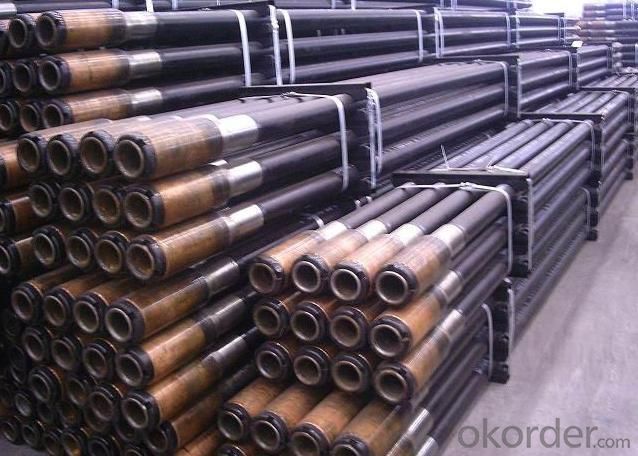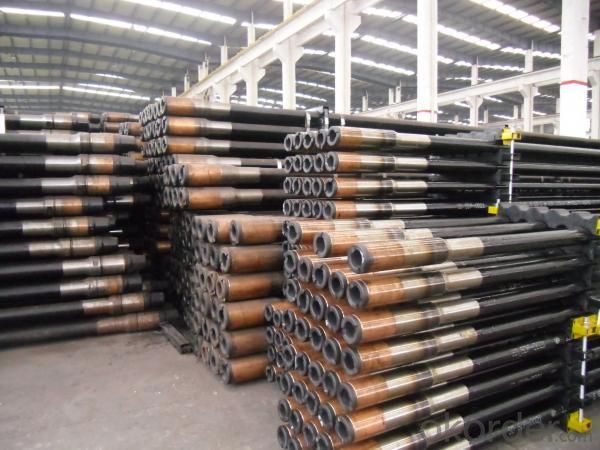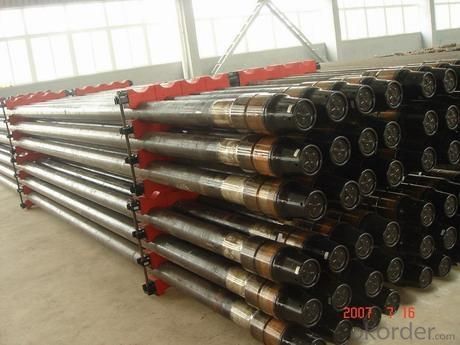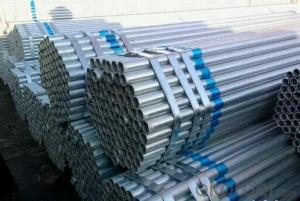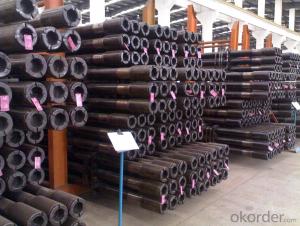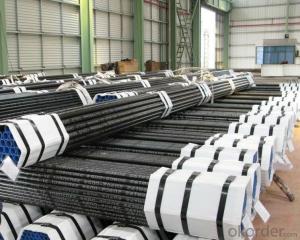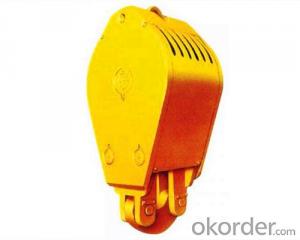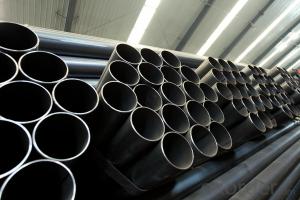API 5DP oilfield use drill pipe
- Loading Port:
- Shanghai Port
- Payment Terms:
- TT or LC
- Min Order Qty:
- 1t m.t.
- Supply Capability:
- 5000 Tons Per Month m.t./month
OKorder Service Pledge
OKorder Financial Service
You Might Also Like
Main feature:
A. The drill rods comply with the provisions of API SPEC 5D & API SPEC7.
B. The grade of steel are determined according to the requirements of Group 1 & Group 3 of API SPEC 5D.
C. Drill pipe joints at the same level comply with the provisions under the Standard API SPEC 7.
Drill Pipe Feature:
A. High precision in size and shape
B. Good low temperature toughness
C. Excellent comprehensive mechanical properties
D. High connection strength and sealability
E. Large inside diameter of tool joint
F. High torque resistance
G. High fatigue strength and long fatigue life
Internal Coating Feature:
A.High abrasion resistance and low friction factor
B. Good adhesion and flexility
C. High application temperature and pressure
D. High hardness and impact resistance
E. Good corrosion resistance
Hardbanding Feature:
A. Good balance between antiwear and friction-reduction
B. The wear rate is less than 6% of that of bare tool joint, which can prolong 3 times of the
tool joint service life
C. Good property of friction-reduction, which can reduce the casing wear to the least, and its
wear to casing is less than 11% of that of bare tool joint
D. Reduce the torque of drilling string
E. Good weldablity with little splash and good rewelding preformance
F. Friendly to environment
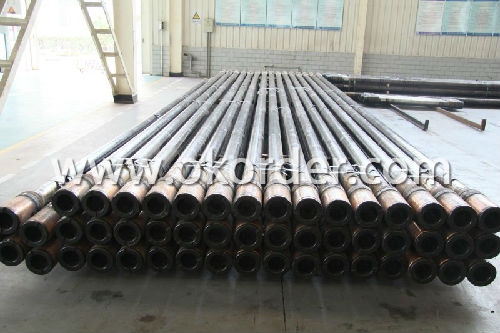
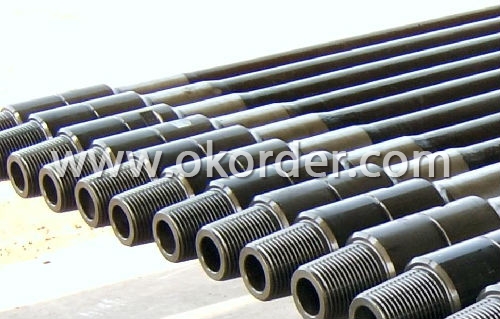
- Q: How do steel pipes handle water erosion?
- Steel pipes are highly resistant to water erosion due to their inherent strength and durability. The smooth surface of steel pipes minimizes friction and turbulence, reducing the likelihood of erosion. Additionally, steel pipes can be coated with protective layers, such as galvanization or epoxy, that further enhance their resistance to water erosion.
- Q: What are the common applications of steel pipes in construction?
- Steel pipes are commonly used in construction for various applications such as structural support, plumbing, water distribution, gas transportation, and HVAC systems. They provide strength, durability, and resistance to corrosion, making them an ideal choice for these purposes.
- Q: What are the different grades of steel used for pipes?
- The different grades of steel used for pipes include carbon steel, alloy steel, and stainless steel.
- Q: Can steel pipes be used for petrochemical plants?
- Yes, steel pipes can be used for petrochemical plants. Steel pipes are commonly used in petrochemical plants due to their high strength, durability, and resistance to corrosion. They can handle high-pressure and high-temperature applications, making them suitable for transporting various chemicals and gases in petrochemical processes.
- Q: What are the advantages of using steel pipes in construction?
- There are several advantages of using steel pipes in construction. Firstly, steel pipes are highly durable and have a long lifespan, making them ideal for long-term projects. Secondly, steel pipes have a high strength-to-weight ratio, meaning they can support heavy loads without being bulky or cumbersome. Additionally, steel pipes are resistant to corrosion, which ensures their longevity and reduces maintenance costs. Moreover, steel pipes are adaptable and can be easily fabricated and customized to fit specific project requirements. Lastly, steel pipes are eco-friendly as they can be recycled, reducing waste and promoting sustainability in construction.
- Q: Can steel pipes be used for chimney flues?
- Yes, steel pipes can be used for chimney flues. Steel pipes are commonly used for chimney flues due to their durability, heat resistance, and ability to withstand high temperatures. They provide a reliable and efficient solution for venting smoke and gases from a fireplace or stove.
- Q: Can steel pipes be used for high-temperature applications?
- Yes, steel pipes can be used for high-temperature applications. Steel is a durable and robust material that can withstand high temperatures without deformation or structural failure. It has excellent heat resistance properties, making it suitable for various industrial processes, such as steam lines, power plants, and oil refineries, where high temperatures are involved. The use of specifically designed high-temperature steel alloys further enhances their performance in extreme heat conditions.
- Q: How are steel pipes manufactured?
- Steel pipes are typically manufactured through a process called seamless or welded pipe manufacturing. In the seamless process, a solid steel billet is heated and pierced to create a hollow tube, which is then stretched and rolled to the desired size and shape. In the welded process, steel sheets are formed into a pipe shape and welded along the seam. These pipes are then further processed and finished before use in various industries.
- Q: What is the difference between steel pipe and aluminum pipe?
- The main difference between steel pipe and aluminum pipe lies in their composition and physical properties. Steel pipes are primarily made of iron and carbon, with other elements added to enhance their strength and corrosion resistance. On the other hand, aluminum pipes are made entirely of aluminum, which is a lightweight and highly corrosion-resistant metal. One significant distinction between steel and aluminum pipes is their weight. Steel is a denser material compared to aluminum, meaning that steel pipes are generally heavier and sturdier. This characteristic makes steel pipes suitable for applications requiring higher structural strength and load-bearing capabilities. Aluminum pipes, on the other hand, offer distinct advantages due to their lightweight nature. They are around one-third the weight of steel pipes, making them easier to handle, transport, and install. This lightweight property also makes aluminum pipes more suitable for applications where weight reduction is crucial, such as in aerospace and automotive industries. Another crucial aspect to consider is corrosion resistance. Steel pipes are prone to rusting and corrosion, especially when exposed to moisture or corrosive environments. To combat this, steel pipes are often coated with protective layers or galvanized to enhance their resistance to corrosion. Aluminum pipes, on the other hand, have excellent natural corrosion resistance due to the formation of a thin layer of aluminum oxide on their surface. This oxide layer acts as a protective barrier, preventing further corrosion and degradation. Cost is another factor to consider when comparing steel and aluminum pipes. Steel pipes are generally more cost-effective compared to aluminum pipes, primarily due to the lower cost of raw materials and manufacturing processes involved. However, it is essential to consider the specific requirements and durability needed for the intended application, as the long-term maintenance costs and lifespan of steel and aluminum pipes may vary. In summary, the difference between steel and aluminum pipes can be summarized based on their weight, strength, corrosion resistance, and cost. Steel pipes are heavier, stronger, and more prone to rusting and corrosion but are generally more cost-effective. Aluminum pipes are lightweight, corrosion-resistant, and costlier but offer advantages in weight reduction and specific applications where corrosion resistance is crucial. Ultimately, the choice between steel and aluminum pipes depends on the specific needs of the project and the desired properties for optimal performance.
- Q: Can steel pipes be used for heat transfer applications?
- Heat transfer applications can utilize steel pipes as they are a great option for transferring thermal energy from one location to another. Steel is known for its excellent heat conductivity, making it a popular choice in heating, ventilation, and air conditioning (HVAC) systems, industrial process heating, and steam distribution networks. The high thermal conductivity of steel ensures efficient heat transfer, effectively distributing heat throughout the system. Moreover, steel pipes possess remarkable strength and durability, enabling them to withstand high temperatures and pressures commonly encountered in heat transfer applications. In summary, steel pipes are a dependable and extensively employed solution for heat transfer purposes.
1. Manufacturer Overview
| Location | Wuxi, China |
| Year Established | 1991 |
| Annual Output Value | 300,000Tons |
| Main Markets | Europe; Southeast Asia; etc. |
| Company Certifications | API 5L;API 5CT;API Q1;ISO/TS29001 |
2. Manufacturer Certificates
| a) Certification Name | |
| Range | |
| Reference | |
| Validity Period |
3. Manufacturer Capability
| a) Trade Capacity | |
| Nearest Port | Wuxi; Shanghai |
| Export Percentage | 41% - 50% |
| No.of Employees in Trade Department | 3900-4000 People |
| Language Spoken: | English; Chinese; Spanish |
| b) Factory Information | |
| Factory Size: | Above 450,000 square meters |
| No. of Production Lines | Above 10 |
| Contract Manufacturing | OEM Service Offered;Design Service Offered |
| Product Price Range | Average |
Send your message to us
API 5DP oilfield use drill pipe
- Loading Port:
- Shanghai Port
- Payment Terms:
- TT or LC
- Min Order Qty:
- 1t m.t.
- Supply Capability:
- 5000 Tons Per Month m.t./month
OKorder Service Pledge
OKorder Financial Service
Similar products
Hot products
Hot Searches
Related keywords



